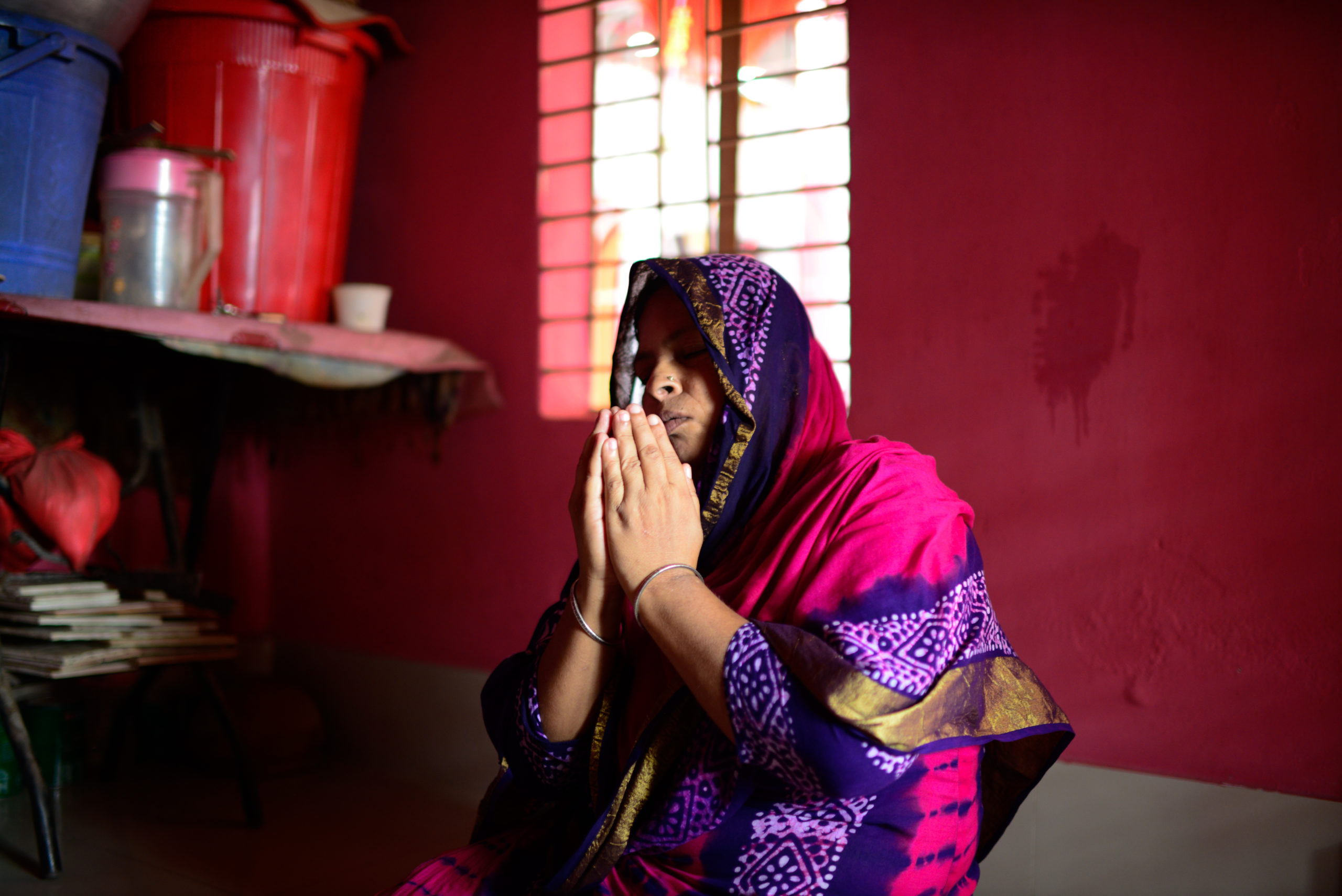The light was still dim when Monowara Begum (pictured) shuffled into her sandals and began her morning patrol. With a slight wheeze, the 44-year-old paced the alleyways, scowling behind gold-rimmed glasses as she listened for sounds of trouble coming from within the corrugated-metal and cinder-block buildings. A foul-smelling stream of sewage and used condoms ran between the makeshift homes. Several times, she flicked a bangled wrist to disperse a cloud of flies. Her other hand was tense, ready to grab a wooden stick if a situation called for it.
Her turf was the walled-off community of Kandapara, Bangladesh’s oldest brothel. Sitting on the edge of a textile town north-west of Dhaka, the capital, it is one of 11 such “brothel-villages” in Bangladesh, which are among the less well-known legacies of British imperialism.
With row upon row of windowless bedrooms, Kandapara is home to more than 600 women and girls. On a normal day up to 3,000 customers frequent its streets. Young children, most born in the brothel, play tag along its narrow passages, tearing past bright pink walls painted with enormous yellow hearts.
Monowara (as she is known in the brothel) was trafficked into Kandapara as a child over 30 years ago. Since then, armed with little more than her wits, she has learned to navigate the institution’s intricate hierarchies, cruelty and violence. Today she is one of the most powerful women in the brothel.
Her resilience has been desperately needed over the past year. When coronavirus began to encroach last March, policemen padlocked the brothel gates to keep customers out. Weeks ticked by, and many women had no secure access to income or food. At times the pandemic has pushed Kandapara’s sex workers close to starvation.
A short-term loss of customers was not the only threat the women faced. Some people in the local town of Tangail had for years been trying to shut down the brothel. Monowara feared that an outbreak of coronavirus within the brothel would provide them with invaluable ammunition. She and hundreds of others had been enslaved in Kandapara, yet it was also their bulwark against destitution. Monowara used to lie in bed planning her escape. Now she was kept awake by the possibility that Kandapara would soon close for good.
When the virus first arrived in South Asia, Monowara would watch the evening news and memorise the symptoms. In the morning she would bark instructions at the younger girls to look out for coughing or signs of flu, and to wash their hands for a long time. She didn’t tell them that she was afraid she might die, that she worried nobody would hug her or give her a proper goodbye. Life had taught her one thing: a woman must never show weakness.
As a child Monowara thought she could outpace danger. Growing up in a farming family in the slow, muggy market town of Sakhipur she quickly learned the Koran by rote. She was faster than her friends in the schoolyard andmore nimble at climbing trees. Her mother had a playful streak too. Sometimes she would wake Monowara and her sister in the middle of the night and feed them desserts hot from the fire: banana pakora, shemai pitha, chitoi pitha, baked, fried or boiled in milk, jaggery and spices.
On a normal day up to 3,000 customers frequent the brothel
When Monowara was 11, her mother died in childbirth. Monowara swore she’d never eat sweet things again. The baby didn’t survive and six months later Monowara’s father died too. Monowara and her sister became the shared property of their seven uncles. These new guardians told Monowara she was lazy and difficult – she hadn’t dried the straw properly, hadn’t swept their floors right.
Monowara had never been an “easy cup of tea”, as her mother used to say while she combed coconut oil through her daughter’s black hair. When one uncle picked up his cattle stick and threatened her with it, Monowara tore through the green jute fields until he was only a speck. When another sent her to bed without food for three days, she sneaked into a neighbour’s house and feasted on their jackfruit. Working her nails under the firm, prickly skin, she pulled out handfuls of flesh before wrapping the seeds in a banana leaf and burying them deep in the soil.
In 1988, not long after Monowara turned 12, one of her uncles married her off to a man in his 30s. Her new husband raped her frequently. When he invited his friends to do the same, she ran away to her maternal uncle’s house. That turned out to be no sanctuary: he also tried to rape her.
Monowara thought back to rumours she’d heard about a village near Tangail, an hour away, where women and girls lived alone. Men visited only to pay them, she’d heard, though she wasn’t sure why. Whatever was going on there had to be better than her current situation, she thought. At 3am, as her uncle and aunt slept, Monowara moved silently through their mud-walled hut, her mother’s wedding sari in her arms. Outside, in the wash of moonlight, she wrapped the embroidered red silk around her waist, pleating and folding the fabric, trying to make sure it didn’t drag on the floor.
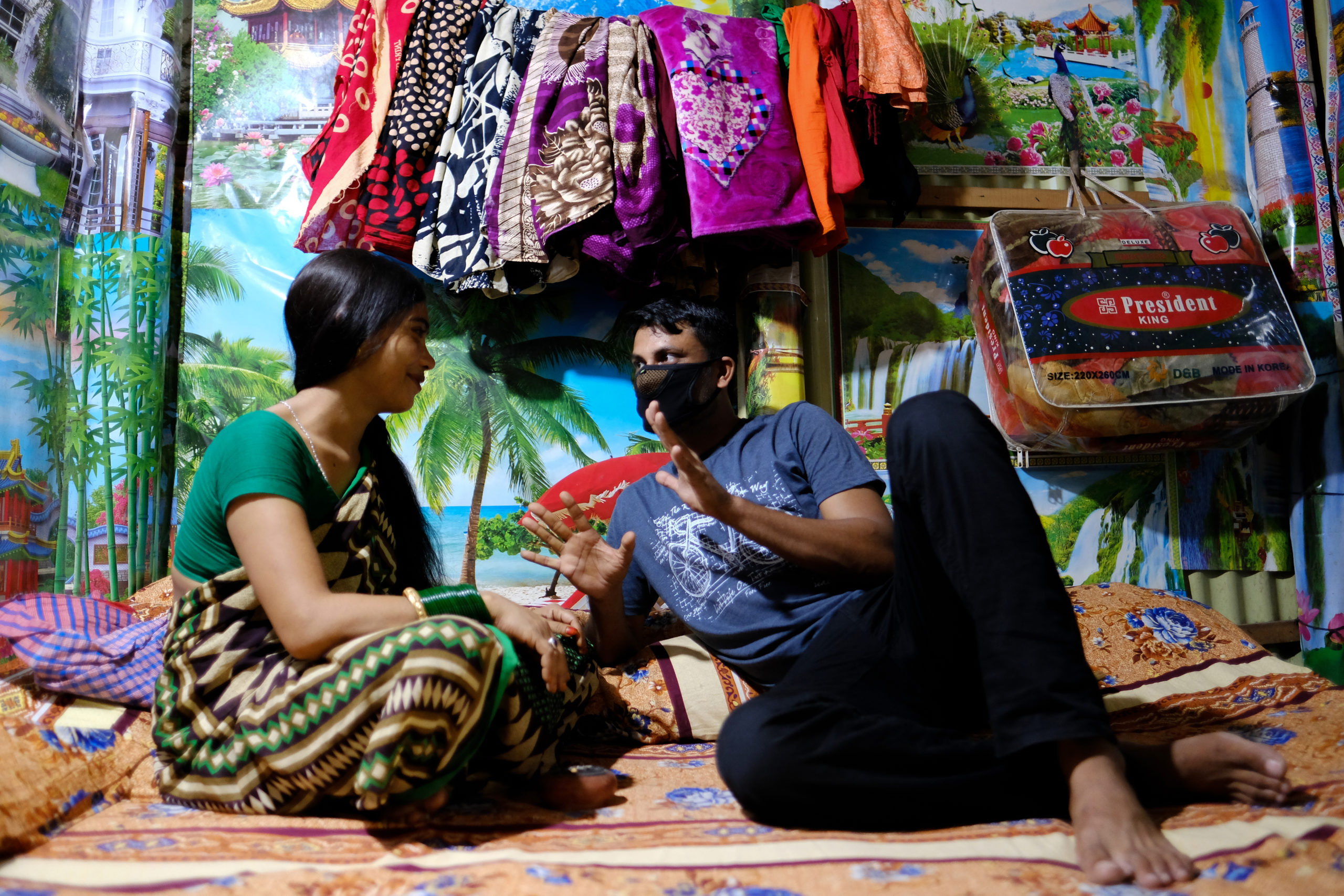
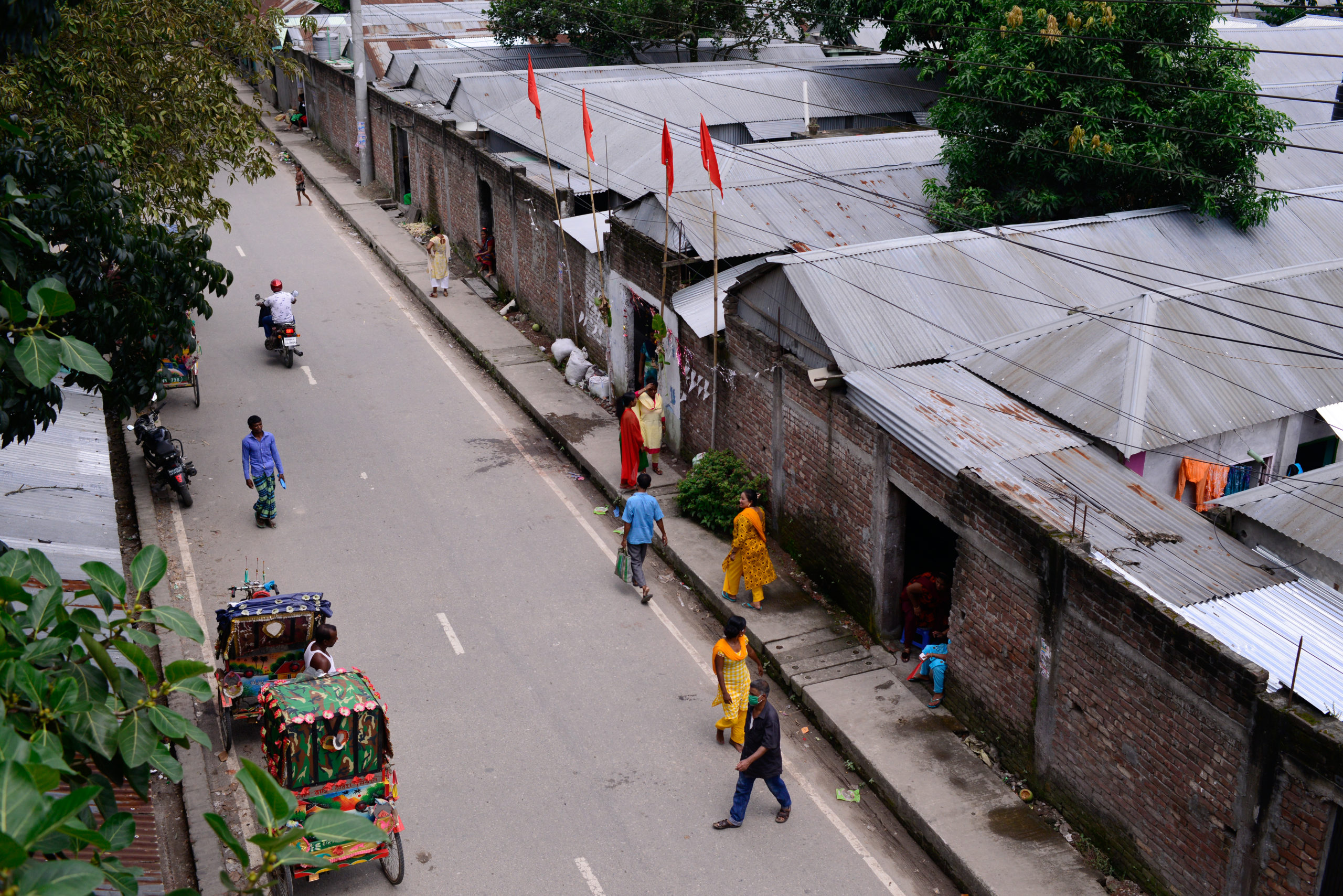
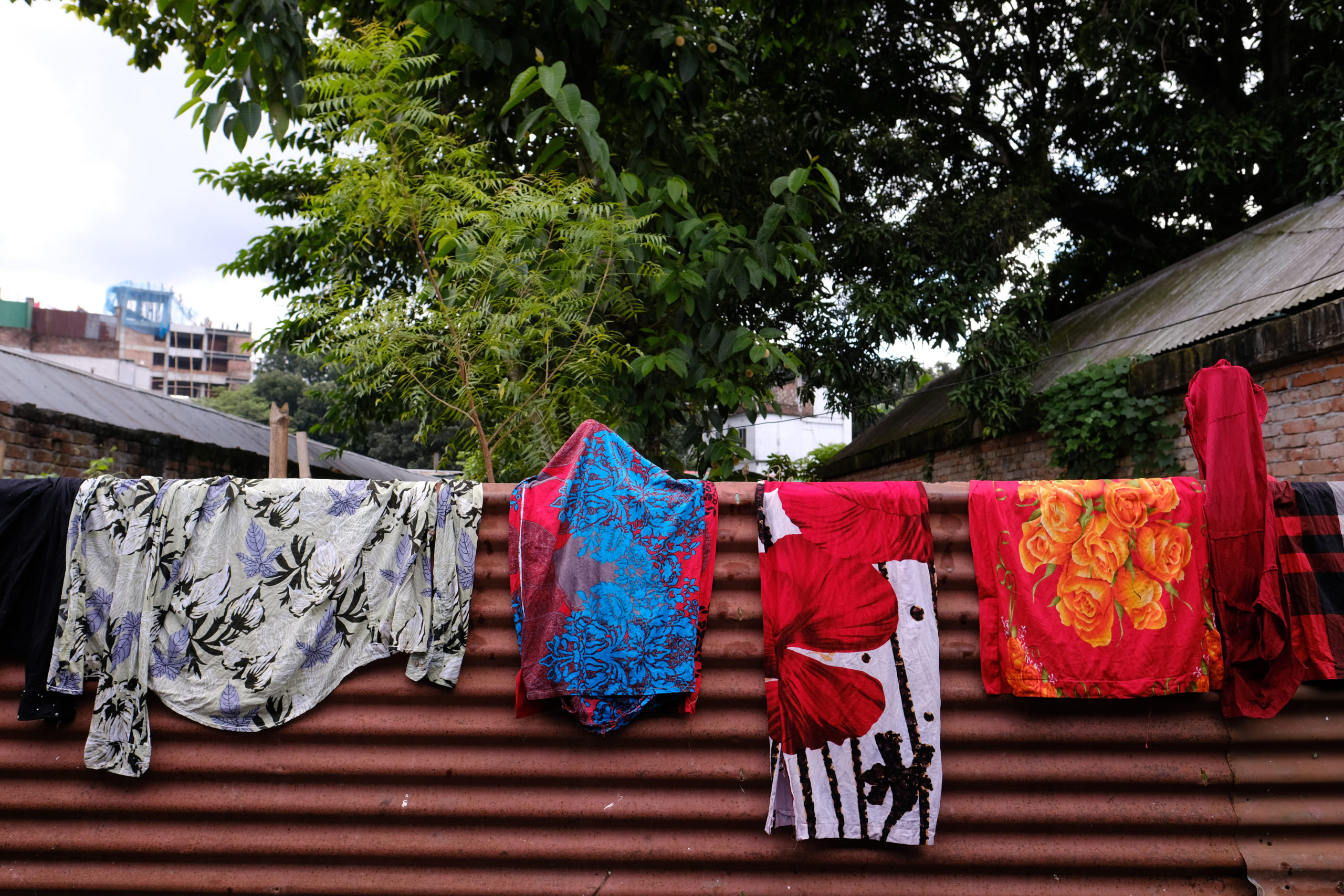
The last thing her mother had told her before she died was to try to be kind. She hoped she could remember how to behave in this village, not to be rude or let her mother down. She lifted her skirt and ran to the local market. Monowara had no money when she left her uncle’s house, but she found a bus driver who had known her father and he agreed not to charge her for her ticket. She didn’t know where to go once she got off the bus in the town of Tangail. A tea vendor saw her standing by his stall and offered to help her find work as a maid – but after a few months, her new employer tried to marry her too. For the third time in a year, 12-year-old Monowara ran away.
Back on the streets of Tangail, Monowara described the women’s village to a rickshaw driver and begged him to take her there. He drove her through the town until they reached a cluster of shacks rising up out of sticky, ankle-deep mud. The driver called out to a small woman sitting underneath a cotton tree just outside the settlement, who ran barefoot across the road, beckoning for Monowara to climb down.
Monowara felt heat rise to her cheeks: her period had started and she could feel blood soaking into the leather seat. The woman smiled and brought water out to wipe the chair clean. Her name was Sufia, she said. Monowara was welcome to stay and sleep in her bed. She led the child past a barbed-wire fence and into the settlement.
The first three days that Monowara spent with Sufia passed in a haze of exhausted naps, snacks and tea. Sometimes, on her way to the water pump at the end of an alleyway, she’d see girls who looked her age leading men into their rooms. When she asked why, the girls laughed and told her she’d be doing the same thing soon. Monowara knew something was going on, but couldn’t work out what.
On the fourth day Sufia poked her awake. “One of my brothers has come to meet you,” she said. “Take him and talk.” Monowara shook her head. The man standing in the doorway looked even older than the husband she had fled from. Sufia didn’t budge. “The man might be old, but money doesn’t age,” she said. Later, tearful and in pain, Monowara asked Sufia for her fee. The older woman told her that the money had already gone towards paying her rent.
Shaken by the assault and Sufia’s betrayal, Monowara asked for help from one of the navy-uniformed policemen patrolling the brothel. A man had raped her, she told him. Sufia wouldn’t let her go back home. He agreed to question Sufia, who immediately offered the officer a deal: he could rape Monowara – free. “Once you’re here, you’re here,” the policeman told her when she begged him to stop. “You need to do like the others do.”
Life had taught her one thing: a woman must never show weakness
Monowara didn’t want to do anything that the others were doing. One morning several weeks later, she washed her mother’s wedding sari and hung it out to dry in the sun. When she went back to get it that afternoon, it was gone.
After that she had to get away. Just before dawn she slipped through the barbed wire surrounding Kandapara and ran along the darkened streets until she reached Tangail’s main market. There she crouched behind a sack of rice and looked for somebody to ask for help.
A shopkeeper recognised her from the brothel and sent a boy running to wake Sufia, who approached with fury folded into her face. She dragged Monowara all the way back to the brothel, trailed by a crowd of spectators drawn by the 12-year-old’s screams. Monowara yelled until her throat was sore. “You’re acting crazy,” Sufia told her. Another woman threatened to beat Monowara until she was quiet. They shut her in a room and set up a guard: customers came and went but Monowara wasn’t allowed to leave.
The industrial-scale complex of child abuse Monowara had walked into was some 200 years in the making. Though the exact date of its establishment is unknown, Kandapara is a product of the British Empire. The brothel sits on the banks of the Louhajang river, a tributary of the much larger Brahmaputra, one of the great arteries of imperial trade. Kandapara was one of several brothel-villages that grew up along the course of the great river, which flowed from the Himalayas down to the Bay of Bengal. Others, such as Daulatdia to the west, were set beside railway lines, also built during the era of empire.
The British transformed prostitution in South Asia by moving sex workers into enclaves such as Kandapara, as well as establishing red-light districts in cities. In the 19th century venereal disease was rife among overseas regiments and the government in London was desperate to keep it under control. Despite evidence that these soldiers were infecting local women, not the other way round, across the empire administrators segregated sex workers, confining them to houses and settlements where they could be monitored for signs of infection.
The brothels continued to operate after the British left the subcontinent in 1947, providing services for local customers and lucrative rents for landlords. Bangladesh’s independence from Pakistan in 1971 theoretically opened a new chapter for institutions like Kandapara. The young country had a relatively liberal approach to prostitution, and the profession was formally declared legal in 2000. A clause in Bangladesh’s constitution also said that the state would “endeavour to prevent” the trade, an ambiguity that haunts Bangladesh’s sex workers to this day. Sex workers are tolerated but their rights are not properly enforced and they have limited legal protection. Local officials are legally obliged to certify that everyone working in a brothel is over 18, but several charities have reported that many girls in such establishments are under 15.
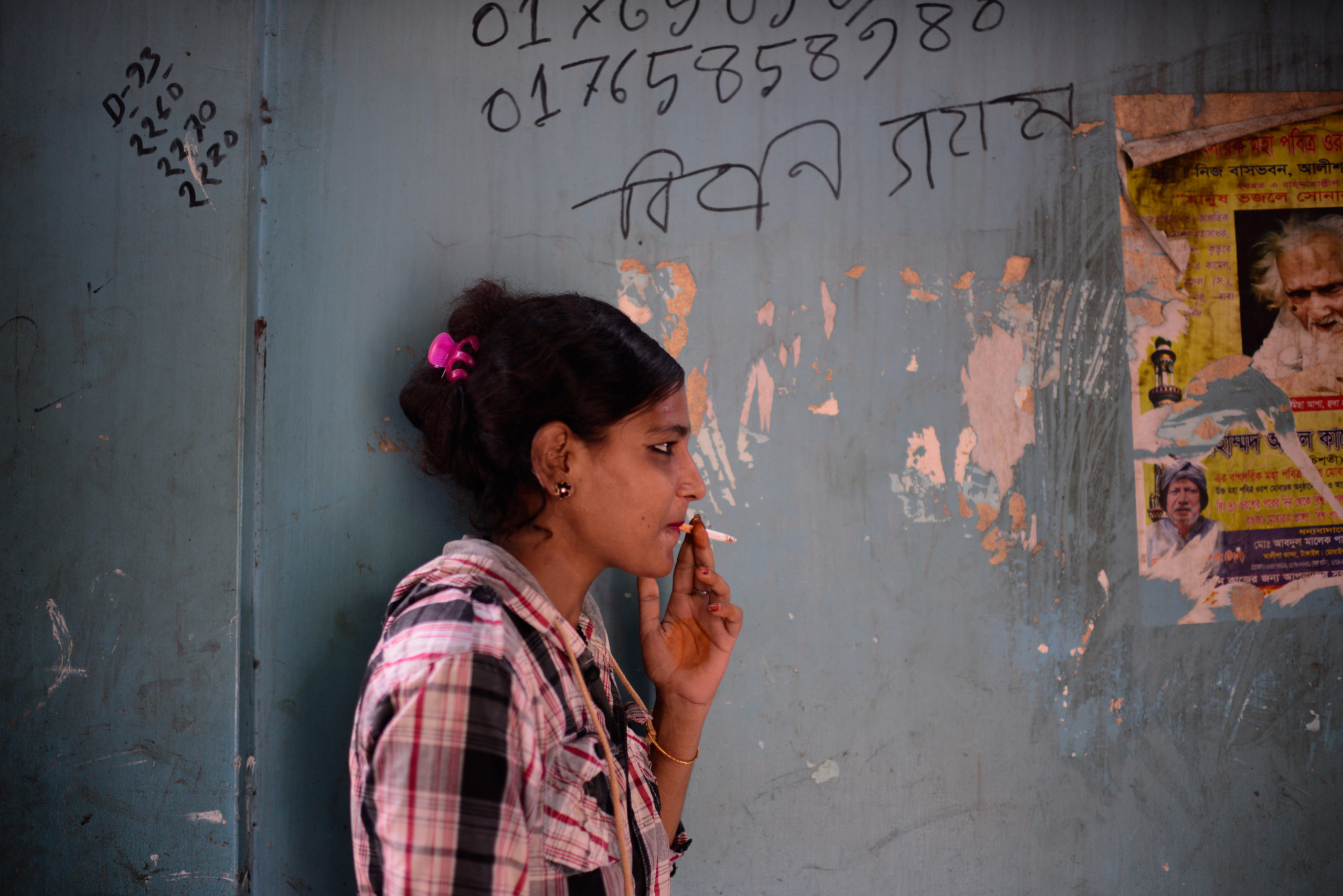
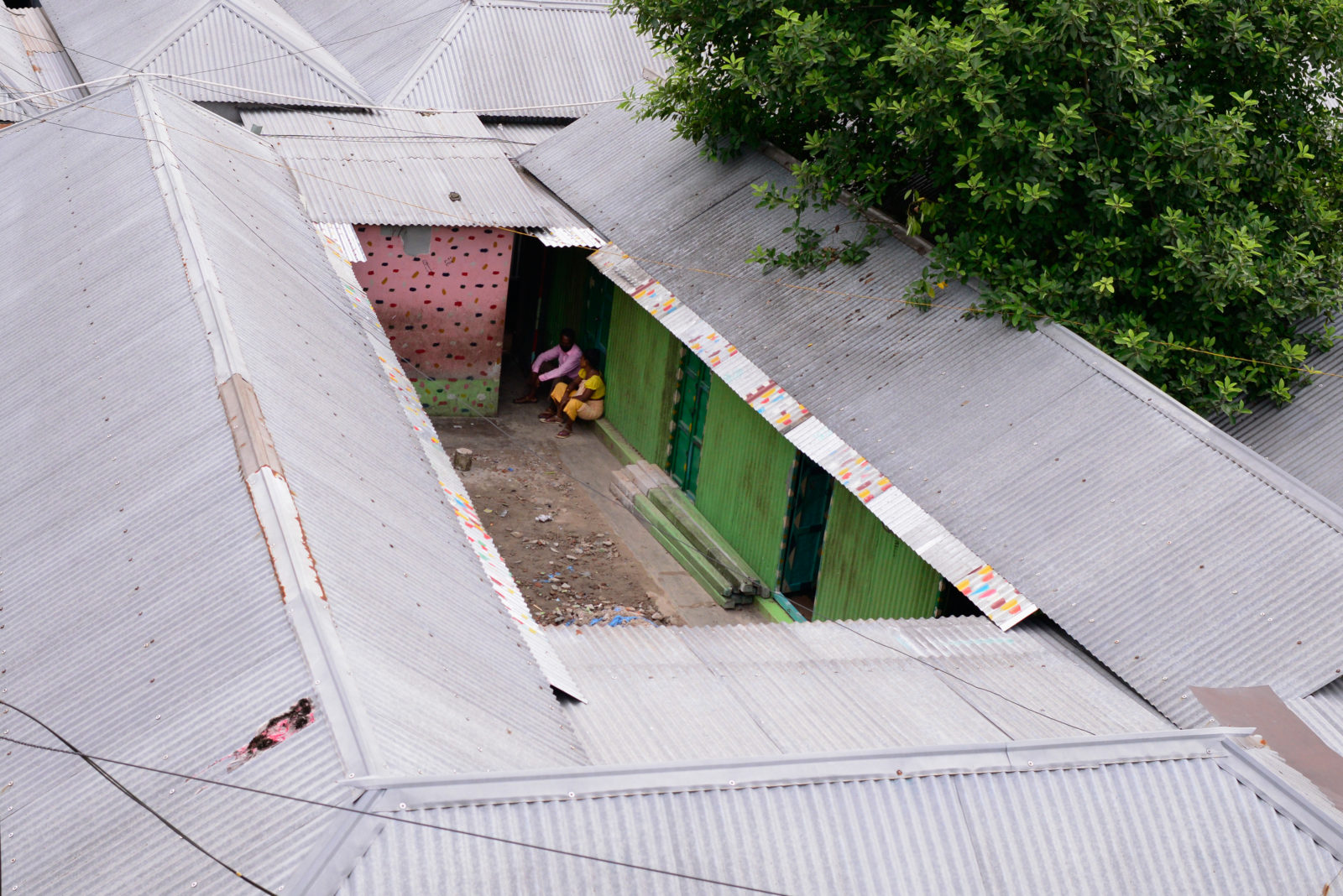
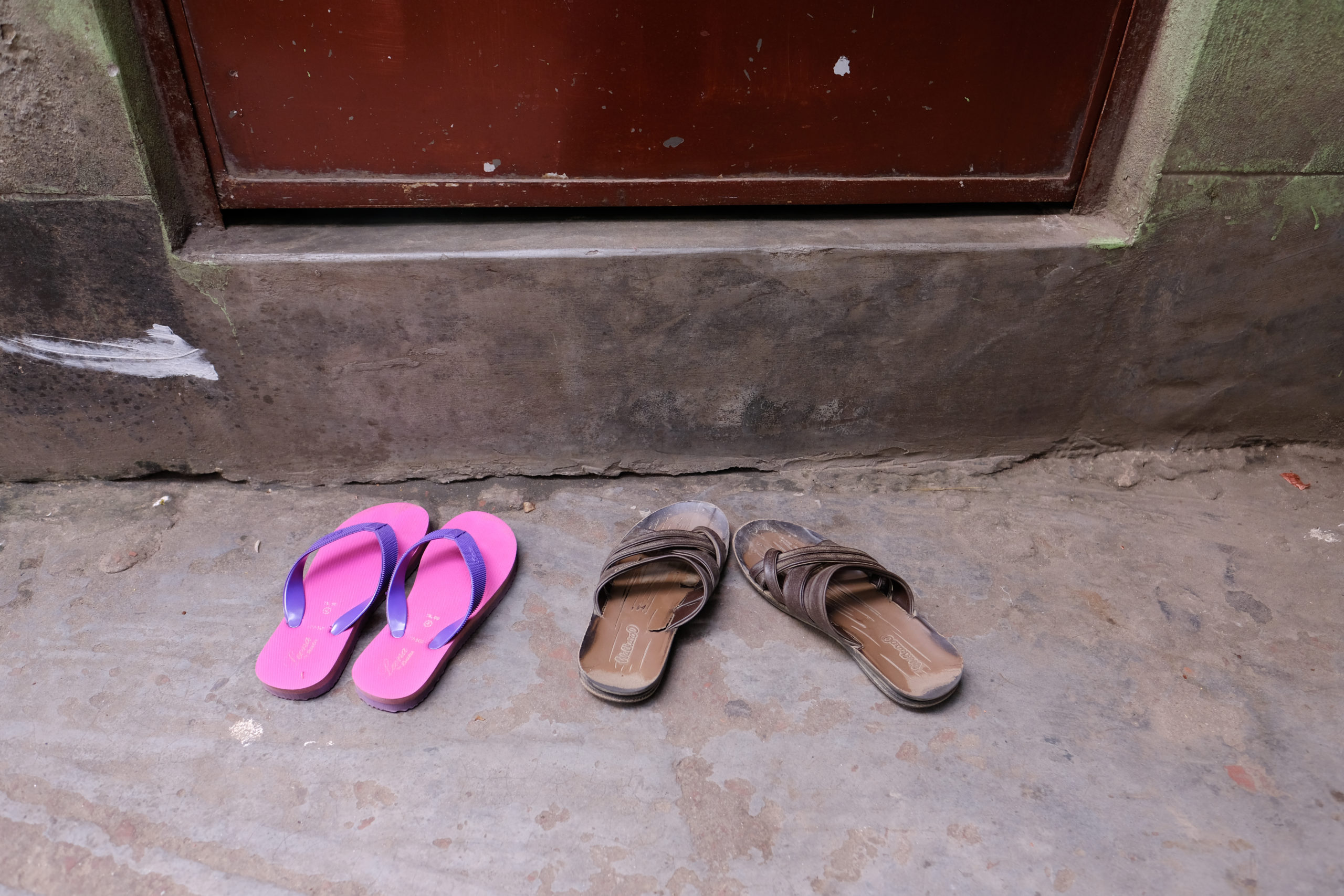
By 1988, when Monowara arrived, Kandapara had become a quasi-urban sprawl with around 50 shops. The bedroom-homes were built on plots of land owned by private landlords from the town or wealthier madams, known in Bengali as sardernis. These sardernis made most of their money not from selling sex but by buying young women or under-age girls to work on their behalf. Each girl would be indebted to the sarderni until she had earned back the sum paid for her. Some sardernis kept ten or 12 girls at a time, using their income to build more houses in the brothel and increase their influence. Even when they had worked off their “debt”, the trafficking victims often had to pay rent to the sardernis.
Each dawn, hundreds of men arrived at Kandapara: bus drivers, police officers, teachers and engineers, boys on their way to school. They waited in lines outside the girls’ bedrooms, unbuttoning their shirts to save time, hurrying out with their sandals in their hands when they were done.
Twelve-year-old Monowara entered on the lowest tier of the brothel’s complicated economic system. On an average day she would see five men, one after the other until nightfall, when she’d soak a cloth in hot water and hold it to her body to try and ease the pain. Sometimes, usually as he got dressed, a customer would ask her how old she was; often he would cry when she told him.
After eight months as Sufia’s girl, Monowara tried to free herself again. She found another police officer and made a more realistic plea: she wanted to stay at the brothel but work independently. The officer decided to help, and ordered one of the private landlords to lease the child a room on the other side of the brothel. Though Monowara would still have to pay rent, in theory it was now up to her how she earned her money – who she had sex with and how much they paid her.
Her husband raped her frequently. Then he invited his friends to do the same
Monowara didn’t know what persuaded the police officer to step in. It might have been that she’d turned up at Kandapara of her own accord, she thought. Sufia hadn’t actually bought her, so Monowara had accrued no debt. The brothel was a lawless place in many ways, yet it nevertheless ran according to a series of unwritten rules. For Sufia to keep her would be to breach the code.
Over the next few years Monowara learned to tune out her experience with men, treating them as though they were background noise. Occasionally she enjoyed the physical contact; mostly she felt either boredom or disgust. She also started to make friends. After a customer bought her a cassette player and a collection of tapes, other girls from the brothel would cram into her tiny bedroom to sing along. They teased each other and joked that Monowara looked like a boy – at 15 she was still beanpole-thin and wore her hair short. On weekends she and her new friends would traipse through Tangail and watch films at the cinema. The plot was invariably the same: a girl was in danger from evil villains until, in the end, a handsome, generous man would step in to save her.
Monowara started to think about her future. She saw two possible routes out of prostitution. The first was to save her earnings and buy a trafficked teenager of her own; some sardernis were in their early 20s, not much older than Monowara, and kept two or three girls locked in small rooms. Her friends tried to interest her in trafficking deals, but she felt that she couldn’t do to another girl what Sufia had done to her. The sardernis shrugged: “Buy or be bought,” they told her.
The other possible path was for a customer to become her boyfriend or husband. Men often whispered such promises as they buckled their belts, and many of Monowara’s friends fell for their murmurings, scrawling their names and phone numbers on their bedroom walls in lipstick, and tearing out photos of wedding saris from magazines. When the local jewellery-maker made his rounds, his glass display case tucked under one arm, girls would crowd round and point to the bangles they would wear on their wedding day. They’d insist that their exit was imminent, that it was only a few months until they’d leave the brothel.
Monowara wasn’t much of a day-dreamer. Movies were all very well, but marriage was always going to end in violence or rape, she thought. In the afternoons, when the men had gone back to their offices and Kandapara’s streets were still, Monowara would sit and listen to the brothel elders – former sex workers in their 50s and 60s who now scraped by on the generosity of younger women. They taught her how to cook, how to look after her health. She didn’t relish the idea of becoming one of them. But it seemed the least bad option.
When a teenage boy in Tangail gets his first job, his older male colleagues may offer to usher him through a rite of passage: an evening spent drinking in Kandapara, followed by the loss of his virginity. After the boy stumbles out of the bedroom, his friends greet him with a raucous round of applause. Now he is part of Kandapara’s massive, multi-generational customer base, one of thousands of men who saunter through the brothel’s gates each day.
Though the fates of Kandapara and Tangail are entwined, the relationship is a tense one. Money filters through Kandapara and back into Tangail’s economy. Women from the town’s poorest families work as cooks and cleaners in the brothel. A sex worker’s average monthly pay is about 30,000 taka, roughly $350 – about five times as much as a cleaner would earn. Local government officials are frequent visitors. Yet the townspeople view Kandapara with distaste and sex workers are banned from being buried in public cemeteries.
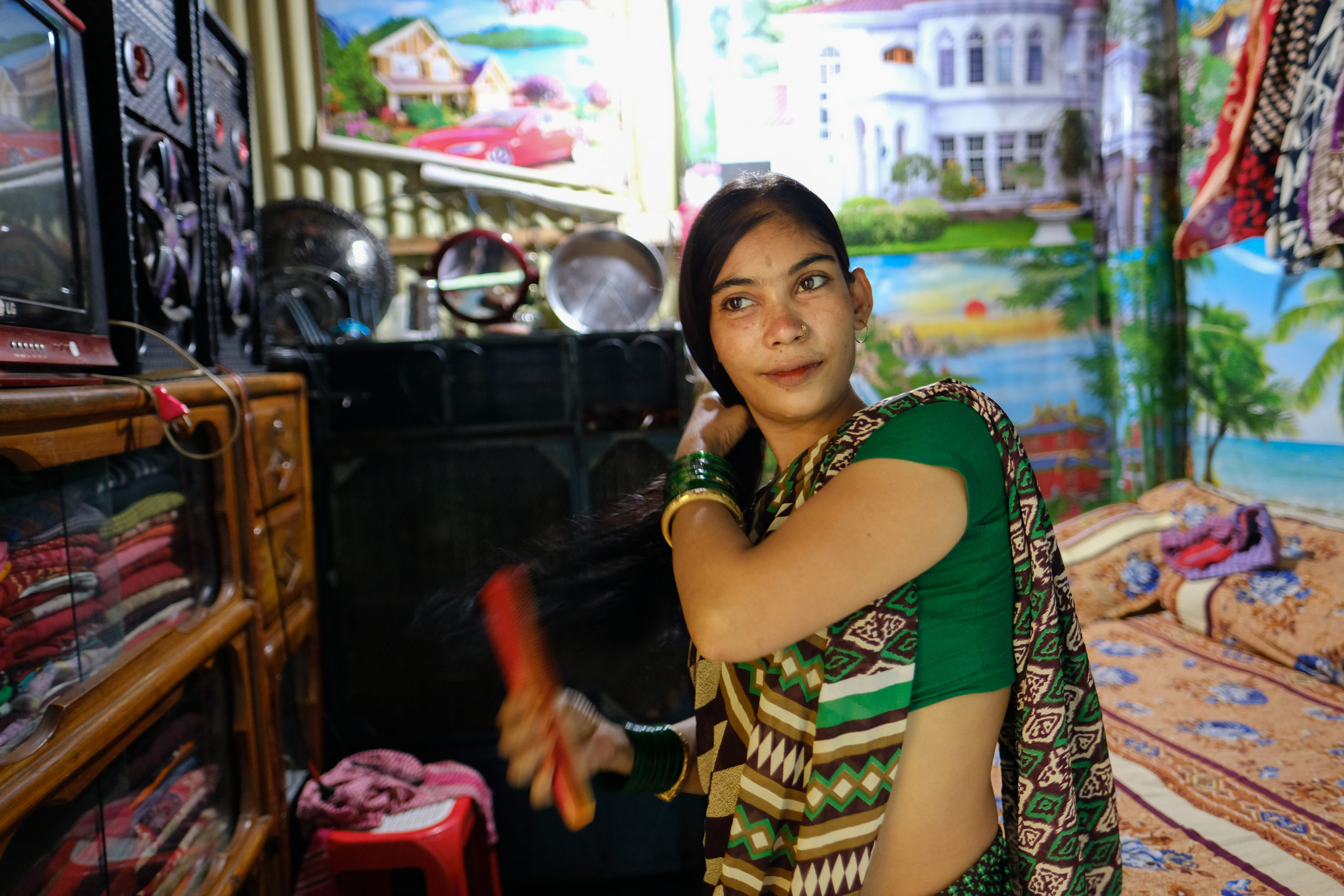
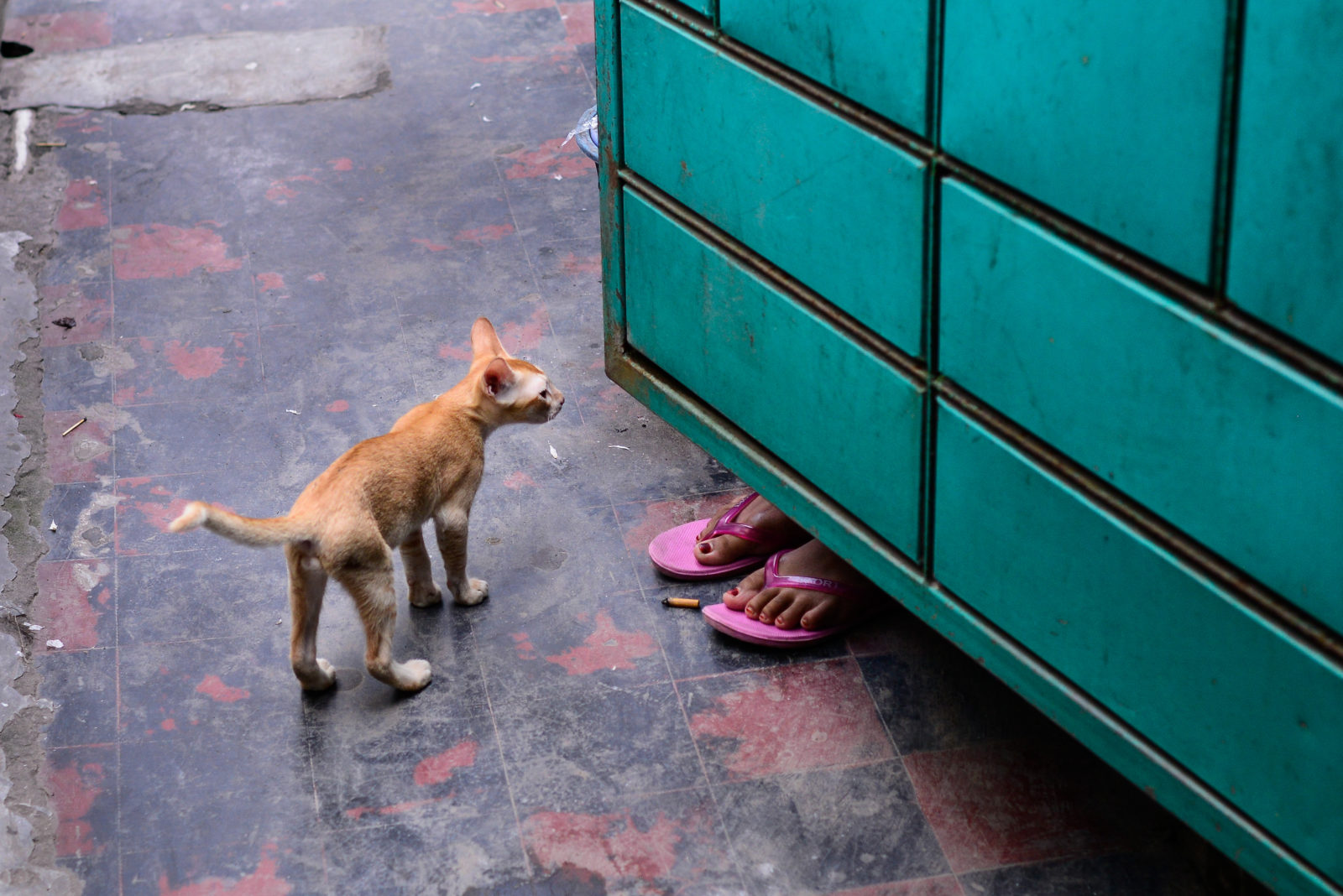
Bangladesh is mostly Muslim, with a significant Hindu minority, and was founded on secularist principles. Over the past 50 years conservative religious voices have become louder. Municipal authorities and religious groups in other parts of the country succeeded in shutting down several brothels during the 1990s, and Kandapara too faced calls for its closure.
For a long time Kandapara’s residents were forced to identify themselves publicly as sex workers when they went in to Tangail. They were forbidden from wearing a salwar kameez and had to fold their saris so that their petticoats showed, in effect branding themselves as women of the brothel. Most humiliating, they weren’t allowed to wear shoes. The brothel’s most senior sarderni worked with the police to fine any woman caught violating the dress code beyond the brothel gates.
As Monowara approached her 20s, she found herself increasingly resentful of the scorn directed her way. She hated the dress code and the way people looked at her. Wives would grab their husbands as she walked to the market; shopkeepers made rude remarks. The shame was insidious: many women became depressed and self-harm was widespread. Monowara would often see groups of women and girls praying at the brothel’s main Hindu shrine, pleading for forgiveness. Some refused to leave the brothel at all.
Monowara wasn’t the only one to chafe at the regulations. Hashi and Alo (a pseudonym) had both been trafficked into the brothel as children; Hashi was 15 years older than Monowara and was now a sarderni herself, controlling several children, including her younger sister. The three women weren’t friends exactly, but they were thrown together in 1996 when a charity called CARE Bangladesh, which promoted better sexual health for the workers of Kandapara, organised a workshop outside the brothel. The women wanted to look smart: all three wore shoes.
The industrial-scale complex of child abuse Monowara had walked into was 200 years in the making
When they got back the brothel’s chief sarderni was waiting for them: she saw the shoes and immediately issued a fine. All were furious and Alo refused to pay. The three women started encouraging others to push back against the rules. Scores of sex workers rallied to their call and began leaving the brothel in shoes and salwar kameez.
The police responded quickly, ripped the shoes from the women’s feet and pushed them to the ground. They briefly arrested Alo. There were rumours that the brothel’s most senior sarderni had placed a bounty on each of the protesters’ heads. For a few days Monowara hid in a neighbour’s house.
For advice, the women approached a doctor from the charity. The doctor organised a meeting with the local police superintendent, and, to Monowara’s surprise, he seemed more interested in listening to them than lecturing them.The following evening he called a meeting at the brothel’s central shrine and announced that the occupants of Kandapara could dress as they pleased in Tangail.
Monowara found the sense of victory intoxicating. A year later the charity offered to pay for 25 women from Kandapara to fly to India for a conference for sex workers’ rights. In Kolkata, Monowara was astonished to see that everyone was dressed the same: she couldn’t tell the difference between sex workers and government officials. She met the members of Durbar, then a co-operative of more than 30,000 Indian sex workers who persuaded her she deserved more than shoes. Monowara’s world shifted further: she realised she wasn’t occhut – untouchable.
On the plane home, Monowara, Hashi and Alo shouted ideas at one another across the aisle. They decided to form an organisation to look after the interests of Kandapara sex workers’ interests. They called it Nari Mukti Sangha: “women’s liberation”. As soon as they announced their plans, 40 women signed up.
The founders of Nari Mukti Sanghaset up an office just beyond the brothel walls. They paid for their makeshift administration with donations, before starting up a microcredit programme and using the interest to cover the office rent. The stairs up to their headquarters were narrow and dusty but they painted the bannisters in yellow and pink and bought a low rattan sofa and a large wooden desk. Once everything was set up, Monowara sat behind the desk, tapped a joint against the ashtray and considered what she wanted to do. She hoped to persuade the government to build a shelter for retired sex workers and a school for children born in the brothel. Most of all, she wanted to end the practice of buying under-age girls.
Before any of this could happen the three women had to consolidate their authority inside the brothel. Kandapara had always had a leader – the richest, most influential sarderni, who had the clout and the resources to bribe the local police department. The chief sarderni at the time was a friend of Monowara’s, a beautiful, charismatic woman called Aleya who charmed police chiefs and government officials so that they turned a blind eye to the empire of child trafficking in return for a cut of the profits. Aleya rarely bought and sold girls herself. She didn’t need to. She wielded her connections and took a percentage of the other women’s income.
Displacing Aleya took years. Rather than confront her directly, the three women created a parallel power structure to slowly undermine her authority instead. They hobnobbed with officials in Tangail and Dhaka, and approached other organisations for additional support such as free condoms and medical supplies. In 2002 they invited residents of the brothel to vote for the leadership committee of Nari Mukti Sangha. Alo became president and Monowara a committee secretary.
Aleya’s patronage network was growing weaker, but the chief sarderni did not accept defeat quietly. Monowara says that she feared that Aleya would have her, Hashi and Alokilled. In the end, the Nari Mukti Sangha organisers contacted the police superintendent who’d backed their dress-codeprotests. They told him that Aleya was bribing notaries and policemen to forge documents certifying that girls as young as 11 or 12 were old enough to work legally in the brothel.
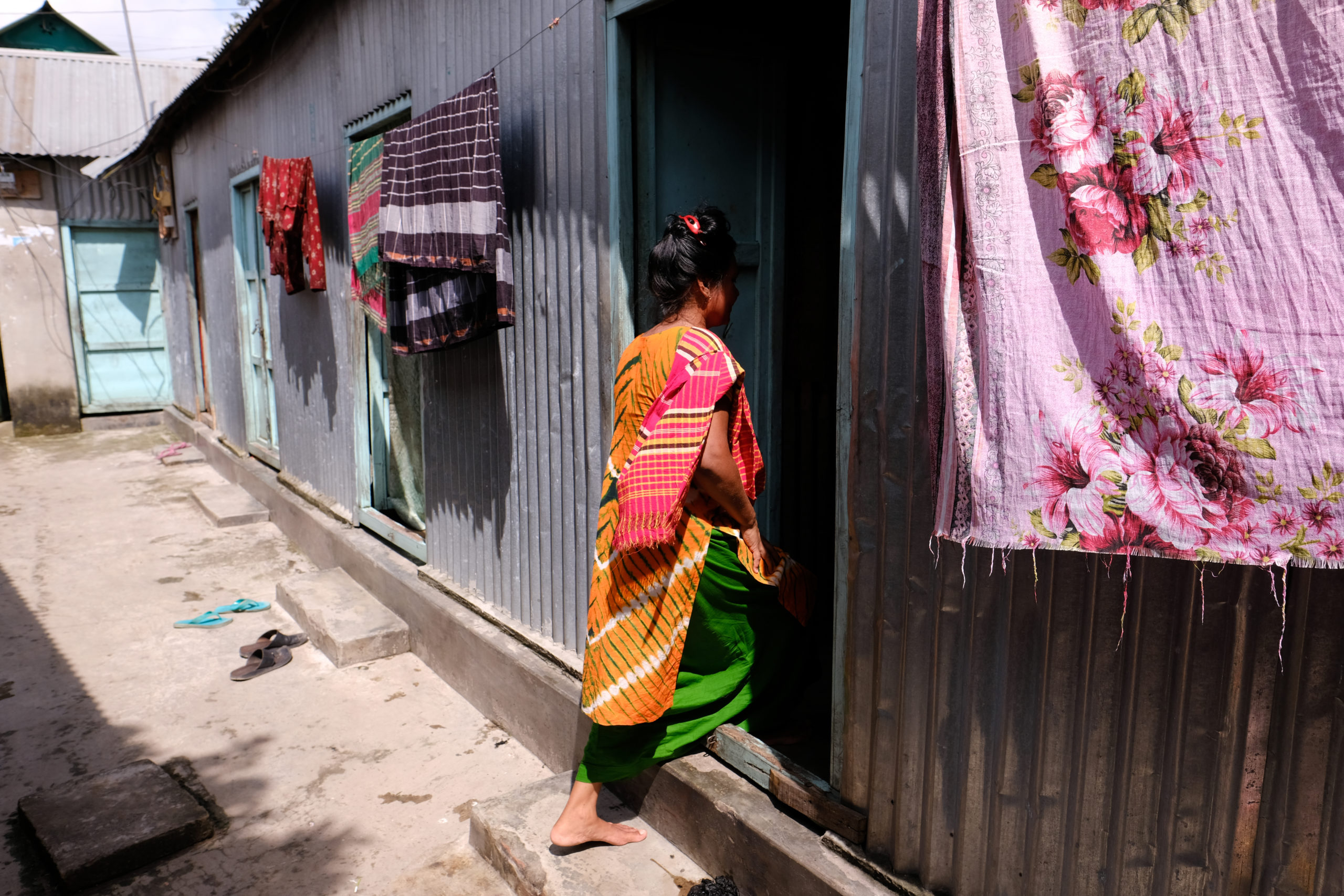
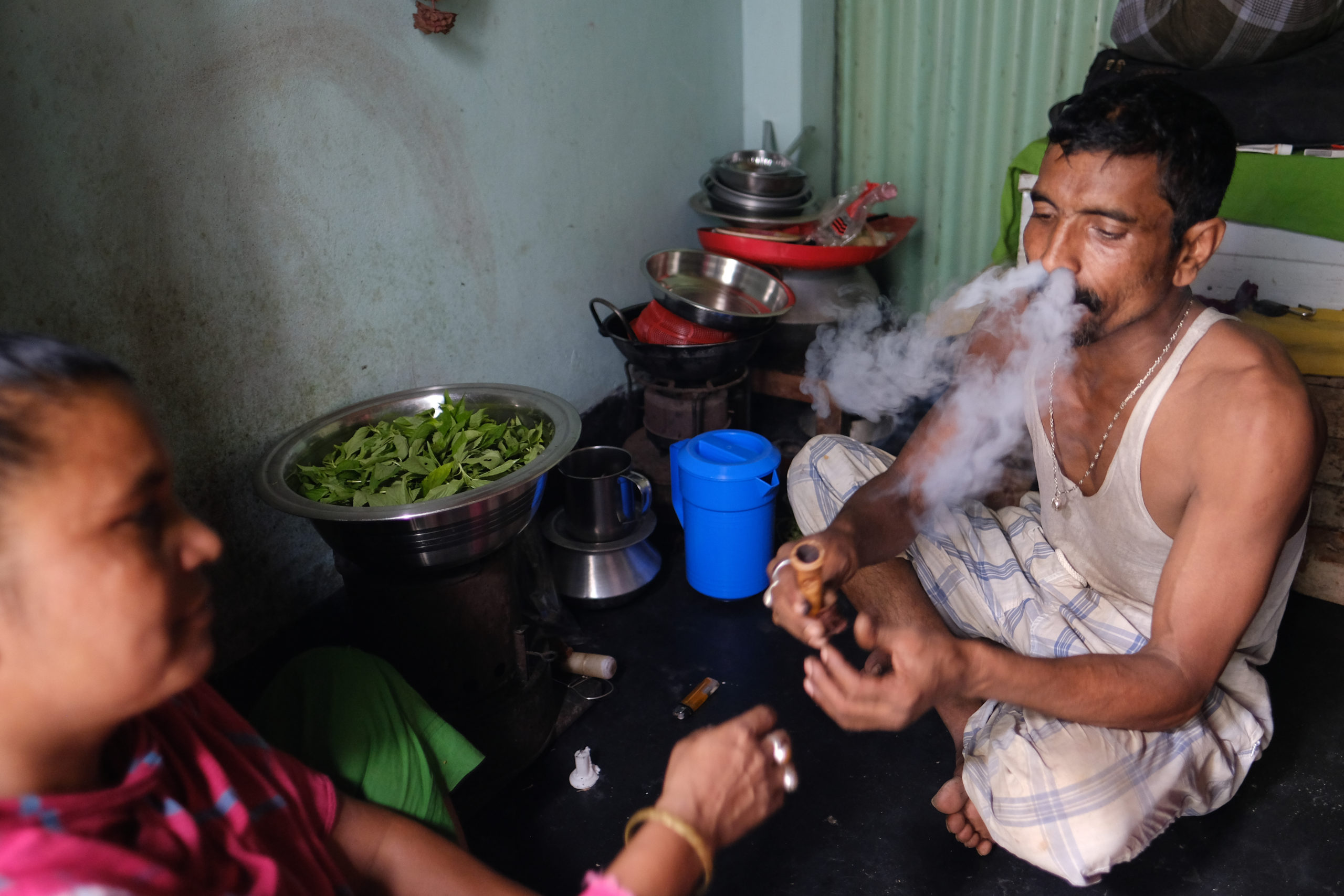
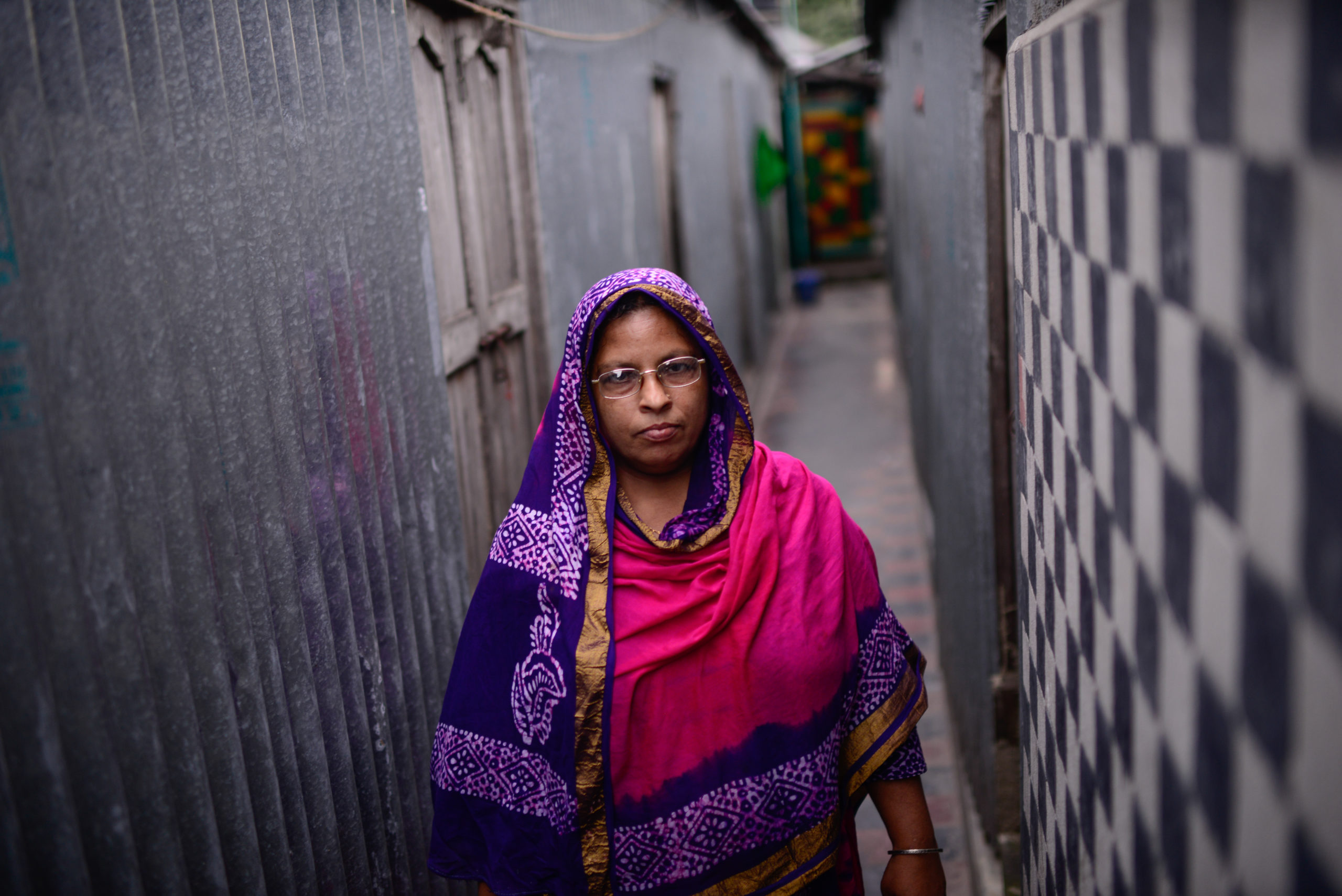
Monowara had personally witnessed a policeman beating one of Aleya’s girls to death with a towel stuffed in her mouth to muffle her screams. In response, the commissioner brought in a new unit to police the brothel. Aleya didn’t stay long after that. In 2004 she slunk out of Kandapara. The women’s liberation organisation had won.
By the time she was in her 30s, Monowara was one of the brothel’s most high-profile figures. She no longer saw customers herself: she took a cut of the rent she collected on behalf of land-owning sardernis. Yet leadership, Monowara discovered, had limits. Every few weeks she’d hear the familiar drag of plastic suitcase wheels across the brothel’s paving slabs and feel her stomach tighten. Some women arrived by choice, often escaping abuse or desperate poverty. Many were sold into prostitution against their will.
Stopping trafficking – the practice that had trapped her in Kandapara – was harder than Monowara expected. Bangladesh was making progress in reducing poverty and improving girls’ access to education, so fewer girls were vulnerable to trafficking than when Monowara had arrived at the brothel. Even so, there was plenty of business for brokers, known as dalals, who profited from the system and weren’t going to give up without a fight.
Monowara would often see the dalals (who were nearly always men) sidle up to sex workers to find out which sardernis might be in the market to buy a new girl. Once directed to a potential buyer, the dalal would initiate a meandering chat over tea during which the sarderni would assess the dalal’s reliability, and the dalal would weigh up how much he could charge. When they reached an agreement the sarderni would give the dalal an advance payment. Within a couple of weeks he would invariably return with a sleepy, terrified teenager. If she was very young, the sarderni might drug the girl with Oradexon – a steroid typically used to fatten up cows – in the hope of hastening her development.
“Once you’re here, you’re here,” the policeman told her. “You need to do like the others do”
Each dalal had his own technique for finding girls in Bangladesh. Sometimes a man would groom a child into thinking he was in love with her, only to sell her to the brothel as soon as her guard was down. Others teamed up with women to approach girls at bus stops and railway stations, offering them jobs in garment factories and then bringing them to Kandapara instead.
If a child came to Monowara wanting to leave the brothel, she would help them – with her support some 30 girls had escaped Kandapara over the years, she reckoned. The sardernis grumbled behind her back. “They don’t like me, it’s true like daylight,” Monowara would say. Some sardernis tried to ingratiate themselves with Monowara by offering to buy her a trafficked child of her own. Monowara would turn them down with a smile, joking that she didn’t understand the business and would never be rich.
To fulfil her ambition to be president of the women’s organisation, Monowara knew she’d need the support of the sardernis, who continued to carry weight in the brothel. Even the loudest or rudest woman would fall silent as a sarderni strode past, wrists and ankles jangling with silver and gold. Monowara never reported them to the police superintendent or city commissioner, both of whom she spoke to several times a week. If anyone asked, Monowara would say that she hadn’t seen any under-age girls for a long time.
She salved her conscience by telling herself that women and girls in Bangladesh would end up abused and exploited no matter what. At least in Kandapara there was a support network of sorts. If she was in charge, things would be different, Monowara thought. She’d not only bring an end to trafficking, but to the brothel’s incessant drama. There were always rivalries and vendettas in Kandapara: women setting their boyfriends’ friends on other women who’d angered them or got in their way.
Monowara would feel like she was slowly imposing a kind of order, and then the fighting would kick off again – a woman who was addicted to methamphetamine would start beating her child, or a girl would give birth and somebody would try to steal her baby. Sometimes Monowara felt she had no option but to grab a stick from one of the guards. It was in their best interests, she thought, as she cracked the bamboo against the back of a teenager’s thighs. Why couldn’t they just learn to behave?
Monowara liked the brothel best after dark. The streets cooled off, the men had mostly gone and the women could unwind and exhale. Twisting up the volume dial on 20 competing sound systems, they reeled each other arm-in-arm along the narrow streets, a blur of loose hair, laughter and noise.
She was never one for dancing. By the time Monowara was in her 40s she tended to watch the parties from the corner of one of the younger women’s bedrooms, wreathed in cannabis smoke and pouring herself shots of room-temperature moonshine. These were the moments when Kandapara felt most like home. Like she had something to lose.
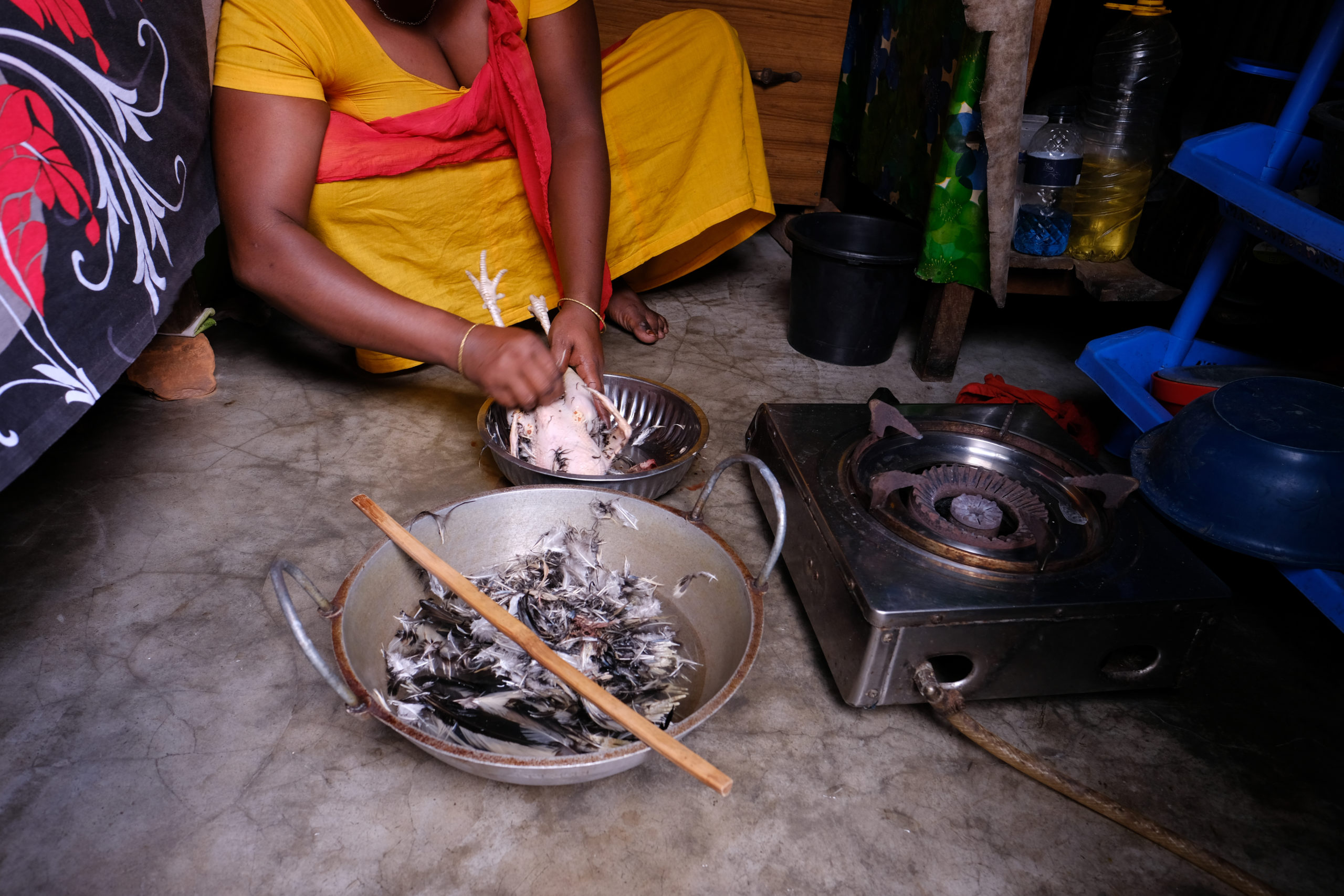
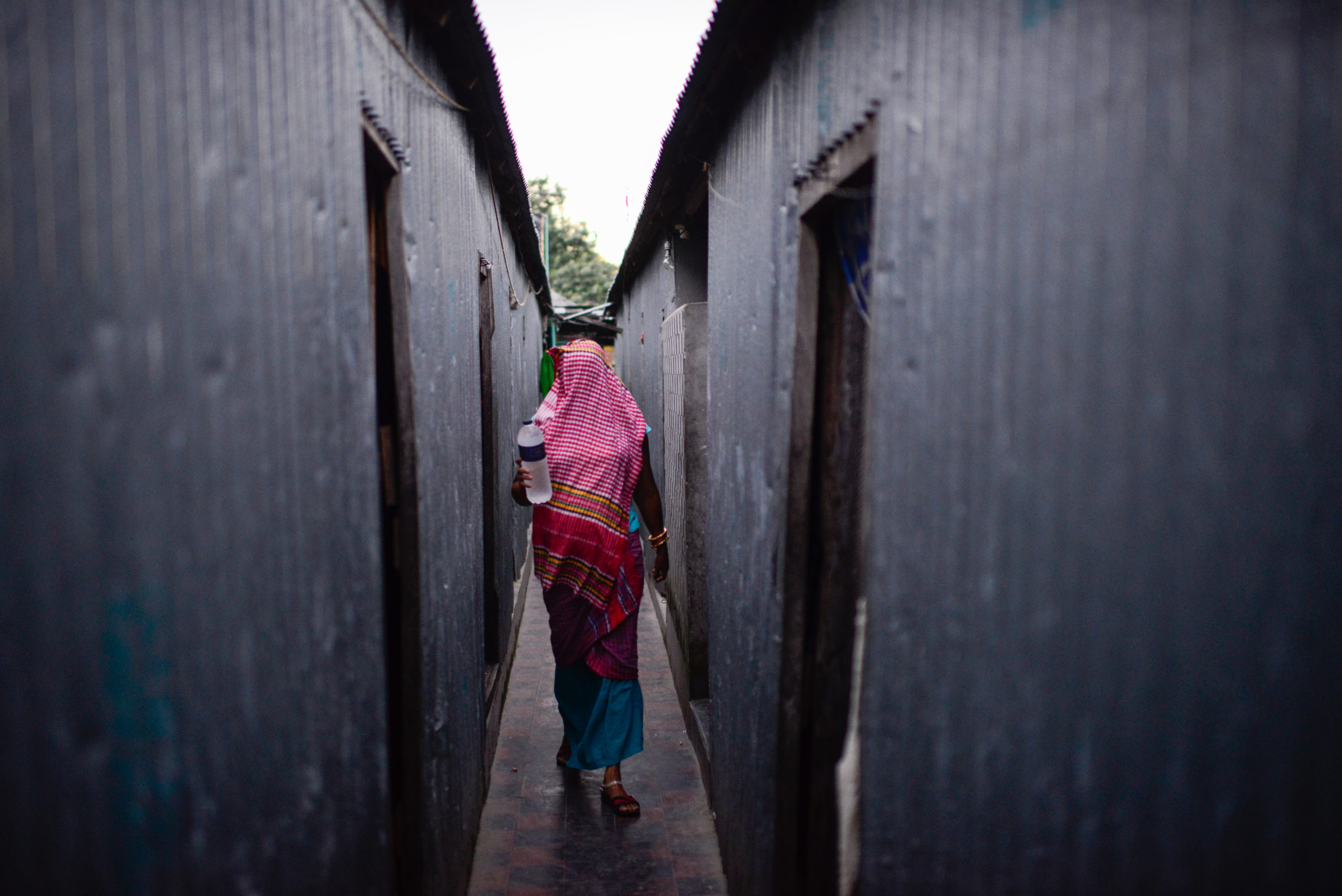
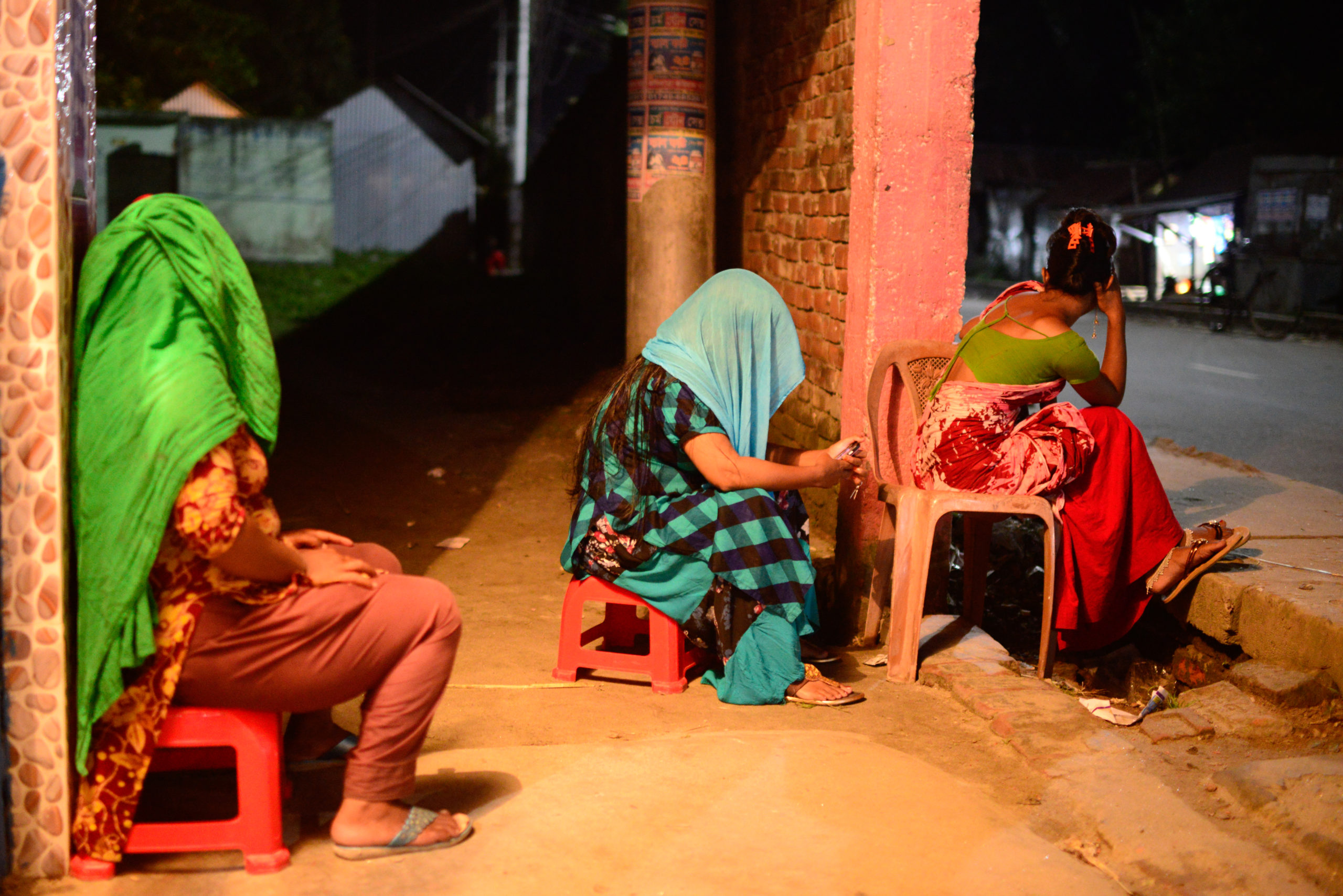
One Saturday morning in the summer of 2014, dozens of young men, led by the brother of the town’s mayor, arrived with sticks and kerosene and threatened to burn Kandapara to the ground if its residents didn’t leave within an hour. Government officials said that the brothel would be shut down. Local newspapers reported that the attack was an attempt to steal the brothel’s land.
Threatened with the loss of their homes, their community and their livelihood, Monowara and her friends travelled to Dhaka to protest. A few months later Bangladesh’s High Court allowed the women to return to Tangail and rebuild the brothel.
Kandapara’s brief closure highlighted the lack of options for its inhabitants. Some of Monowara’s friends tried to find work in the garment industry in Dhaka, but the stigma of prostitution made it hard to get or keep jobs in other sectors. Most ended up soliciting sex on the streets, where they were far more vulnerable to violence.
It was safer for sex workers to stick together, Monowara was sure of it. Old-timers taught new arrivals to read; women in their 20s cooked for those too arthritic to work. Women sometimes took on extracustomers to cover a friend’s rent if she couldn’t work (when recovering from an abortion, for example). If a man beat a woman, the sardernis would rush there with sticks and rocks, drag him out and make sure he didn’t come back.
“Buy or be bought,” the sardernis told her
Sometimes Monowara acted maternally towards the younger women. “Happiness is helping others,” she intoned as she combed her fingers through their hair, repeating her mother’s words. When a woman went into labour – as happened every few months – Monowara tore rags and boiled water to help with the delivery. She loved little more than seeing a newborn’s face.
Nevertheless, it was a lonely life. By the time the pandemic hit in early 2020 and the government locked Kandapara’s gates, there were only ten women remaining of those who had been there when Monowara first arrived. A handful of her friends had met men who’d made good on their promises of rescue. Others had taken their own lives, like sweet-faced Sahana, her “sister by day, daughter at night”. Then there was Anu, who wore her greying hair pulled back in a careful knot as Monowara did, and who had died from AIDS in 2019. And Shirin, who was murdered two weeks before lockdown last March. Nobody knew who killed her.
Even Alo and Hashi, with whom she had founded Nari Mukti Sangha, had taken to disappearing for weeks at a time. They were buying land in order to start new lives outside the brothel. Monowara felt she was losing them. Sometimes she struggled to greet them cheerfully when they came back after a trip away.
There might be an upside to Alo leaving Kandapara, of course. After 18 years Monowara was still just a secretary for Nari Mukti Sangha, and Alo remained the organisation’s president. Elections were supposed to be held every two years but Alo hadn’t bothered arranging them since 2013.
The children of the brothel already called Monowara Netri (leader), and she wanted her authority to be confirmed.She was the person to whom women came to for help. She was the one who took a rickshaw across Tangail at the height of the pandemic to ask the city commissioner for support for Kandapara. She was the one who negotiated a handout of 10kg of rice per person at the start of the outbreak, and a small reduction in rent.
If anyone asked, Monowara would say that she hadn’t seen any under-age girls for a long time
By June last year, women were knocking on Monowara’s door all day long. The rice had run out and the quarantined brothel was starting to simmer with impatience. The first to snap was Hashi, the other member of Nari Mukti Sangha’sfounding trio, and her younger sister, who stole a set of keys from a security guard and forced one of the brothel’s gates open. Monowara screamed at her to stop and the women scrapped before a crowd of spectators. Eventually they were dragged apart. But Hashi and her sister won: against government advice the gates stayed unlocked and customers started to drop by. Monowara didn’t know what to do.
The seasons were shifting, the air was heavy with damp. Sliding her feet out of her leather sandals at the end of the day, Monowara coughed and coughed and worried whether she would survive the coming months. Some nights she prayed for forgiveness. At other times she would brood over the past: the cakes she’d eaten hot from the fire as a child; blood seeping across a rickshaw seat; a wedding sari, stolen from the washing line. So much had gone wrong in her life, she felt it must be her own fault. “Courage comes from your toes and rises to your head,” Hashi would say on bad days. “Just keep walking forwards.”
Sometimes Monowara imagined an alternative life. Would a 44-year-old woman be allowed to move back to Sakhipur and farm rice and wheat without a man? She wondered what her family would look like today if she’d stayed with her husband and had children of her own. Perhaps it would be better than being alone. Then she pictured the man she had been forced to marry, his violent fists, and she laughed. How lucky she was to be free.


 Ali Ahsan
Ali Ahsan